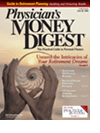Publication
Article
Physician's Money Digest
Avoid Costly IRA Planning Mistakes
Author(s):
It's essential that today's doctorsmanage retirement income wisely ifthey hope to maintain their currentlifestyle during their golden years. Ifyou've been contributing to your retirementplan for many years, or evendecades, it's time to ask yourself, "Am Itaking full advantage of these taxfavoredaccounts and on my way to acomfortable retirement?"
Following are some of the most commonIRA planning mistakes made byinvestors today. The next time you thinkabout your retirement, run down this list,which lets you know what to avoid andwhy, and ensures that you're on the righttrack to life outside of the doctor's office:
• Not taking advantage of thestretch distribution option. The stretchIRA is a way for nonspouse IRA beneficiaries to maximize the payouts from theIRA over their own lifetime expectancy.Many beneficiaries, however, are notaware of how this strategy works or howto implement it. It is also imperative thatwhen they choose this strategy, it isimplemented correctly.
• Not taking advantage of increasedcontribution limits. In 2002, limits for IRAcontributions increased from $2000 to$3000—the first increase in 20 years.
• Taking the wrong RMD. New rulesregarding required minimum distributions(RMDs) were finalized in 2002. Youlikely have not analyzed how these rulesmay impact on your IRA planning strategyand, therefore, may be taking aninappropriate amount. More than likely,you're taking too much out, but if you'renot taking enough, you may be subjectto a penalty tax of 50%.
• Placing the title of the IRA into atrust. As investors begin the process ofestate planning and utilizing trusts to disseminateassets, many consider puttingtheir IRA into a trust. Unfortunately, whatfew realize is that changing the actualownership of the IRA to the trust causesimmediate taxation—including the 10%penalty tax if you are under age 59 1/2. Amore effective strategy is to simply namethe trust as a beneficiary of the IRA.
• Beneficiaries not taking advantageof an IRA. At death, IRAs are included inthe IRA owner's estate and create anincome tax liability for beneficiarieswhen they take the assets. Many IRAbeneficiaries don't realize that IRAs areconsidered "income with respect to adecedent," according to Section 691(c)of the IRS code. As such, beneficiariescan take an income tax deduction forany estate taxes they paid on the IRA.
• Skipping additional catch-up contributions.Let's not forget the additionalcatch-up contribution available tothose aged 50 or older. Currently set at amaximum of $500 annually, this contributionwill increase to $1000 starting in2006. With all of these opportunities tobuild your nest egg faster, you may wantto take advantage of these rising limits,regardless of your age, marital status,and working status.
• Assuming a nonworking spouse cannot contribute to an IRA. Separate spousalIRAs may be established for spouses with little or noincome. These additional retirement savings can make asignificant difference over time, especially if the nonworkingspouse also contributes the $3000 maximumallowable amount ($3500 if age 50 or older) each year.
• Making inappropriate spousal rollovers. Sincemost IRAs list the owner's spouse as the primary beneficiary, one of the most popular strategies for a spousalbeneficiary is to simply roll that IRA into their own IRA.However, there are times when it can be more tax efficient for them to leave the IRA in the owner's name, ordisclaim the assets, thereby allowing the assets to passto the contingent beneficiary.
IRAs provide a great way to receive a regular streamof income during retirement, keep your retirementsavings growing tax-deferred, and create a legacy foryour heirs. By taking time now to focus on IRA planning,put a carefully planned strategy in motion, andavoid common IRA planning mistakes, you can guaranteeyourself more influence over the kind of retirementyou'll enjoy after you finish practicing medicine.
Bruce Harrington is vice president, product marketing and servicesof MFS Investment Management and product manager ofits 529 college savings plans and retail retirement products. Formore information about MFS products, call 866-637-7526 or visit mfs.com.
